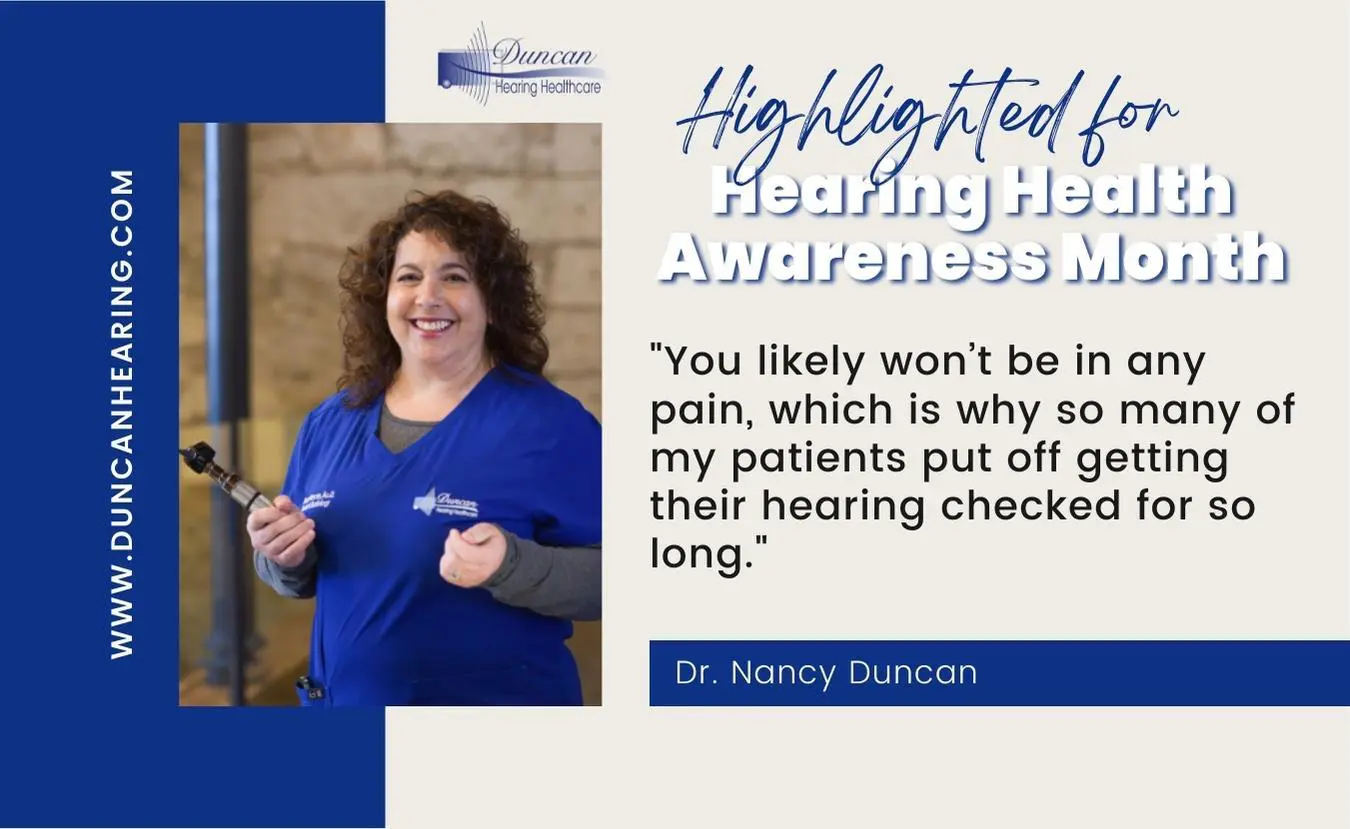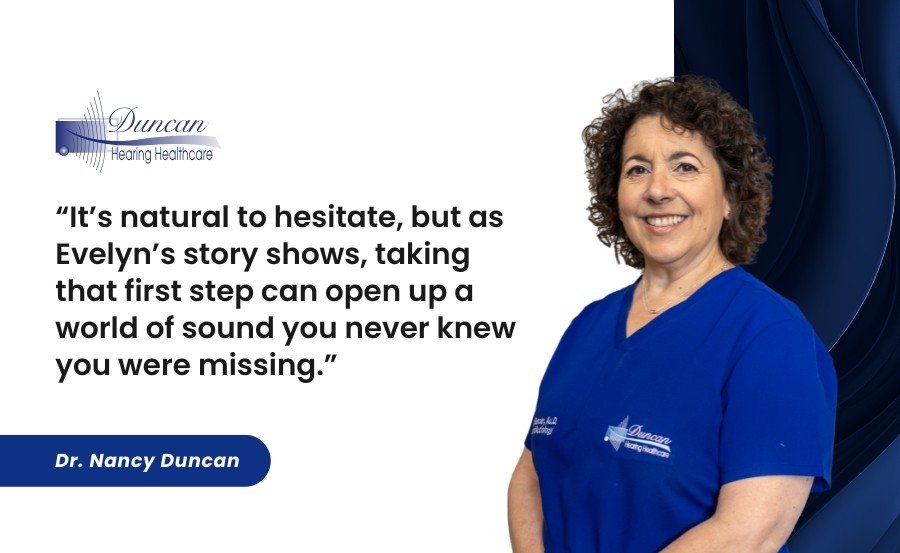Jan 8, 2022
|
Nancy Duncan, Au.D.
How Do I Know If I Have Damaged My Ears Or Have A Hearing Loss?
If you've damaged your ears, you very well may have damaged your hearing.
What Is The Difference Between Damaged Ears And Hearing Loss?
If you have damaged your ears, you won’t necessarily feel any pain, but you’ll likely experience some of the classic signs of hearing loss such as ringing in the ears or noticing that sounds aren’t as clear as they used to be.
You could have been exposed to a loud noise, and the loud noise has damaged the hair cells in your ears. A sign of damage is that you might experience some ringing in the ears after it.
Many of us have experienced that to some degree – we've gone to a loud concert or a loud club when we were younger and left and thought, Oh, that was great.
Our ears were ringing, but we thought that was the best experience ever, just because we didn't know any better.
But the ringing can signify a little bit of damage occurring in our ears. Our hair cells were stressed. They bounced back and recovered, but over time, if we continue exposing them to that type of damage, they won’t recover. And that would eventually turn into a permanent hearing loss.
People often don't realize that if they've been in a car accident with airbag deployment, they may experience ear issues afterwards. I actually was an expert witness on that in a local court case. The airbag deployment volume is very, very loud — over 120 decibels — and that one-time sound can cause a temporary shift in hearing and tinnitus.
Sometimes the hearing loss becomes a more permanent change after a car accident with air bag deployment. If you’ve noticed any hearing changes, get checked for hearing loss.
Or you can have a more traumatic damage to your ear. For example, I have a friend who was using a Q-tip to clean her ear, and someone walked into the bathroom, hit the door to her elbow, and it punctured her eardrum with the Q-tip.
That required a visit to the doctor to make sure everything was okay. Her perforated eardrum healed, which often does happen, but any trauma to the ear should be seen by a physician just to make sure there's no infection or perforation that needs some sort of medical treatment or patching.
In some cases, medical intervention is necessary after trauma to the ear. For example, loud sounds, such as an explosion, can be so loud and concussive that they can cause a rupture of the eardrum.
On the audiology side of things, we tend to see the damage done to ears long term through neglect. The outcome to both trauma and neglect, though, depends on just how long ago that damage occurred or how long that hearing loss has been left untreated.
What Are The Signs Of A Damaged Ear?
The signs of a damaged ear are:
Noticing you’re not hearing well.
Complaining of some ringing in the ears, and oftentimes, it's come on gradually.
A history of noise exposure, whether it be through work or recreationally. Maybe you're a shooter who doesn't wear hearing protection, or you listen to loud music and don't wear hearing protection.
Those are some things that can add up over time.
By the time we audiologists see you:
You might complain of not hearing clearly, especially in noisy environments or more difficult or challenging listening environments.
Your friends and family are starting to notice and complain about being asked to repeat everything. Both parties are getting frustrated about communicating.
You say you need help, that something's not right.
https://duncanhearing.com/wp-content/uploads/2022/04/We-Are-Here-To-Help.png
What Are The Signs Of Hearing Loss?
Signs of hearing loss can vary from person to person, but the most common are:
The person is just not hearing quite as clearly as they once were. It's not that all of a sudden, they wake up one day and they're just not hearing. I think that's the misconception most people have.
They might think that people are mumbling rather than think their own hearing is the problem. They think they can hear people fine. It's very easy to blame somebody else.
The first signs are not picked up by the person with the hearing loss, they're picked up by others.
Ringing in the ears.
Missing quieter sounds such as hearing the blinkers in the vehicle, leaves rustling, the subtle sounds around you that you once heard. Everyone else can hear them, but now you hear nothing. Those are things that you might want to clue in to and get checked for.
It's not that you just don't hear. It's just, you're missing out a little bit on things. And those are the first little subtle signs that it might be time to at least get your hearing checked.
You likely won’t be in any pain, which is why so many of my patients put off getting their hearing checked for so long. We tend to ignore things unless they inconvenience us or cause us pain.
Studies show that people wait about seven years often before they even address a hearing loss from when they start suspecting it.
But an untreated hearing loss inconveniences others often. My mom has started saying that a lot of people are mumbling. It's hard to not get frustrated sometimes.
What I'll always say is, “Has he always mumbled as long as you've known him, or is that more recent?”
When Are Regular Hearing Checks Necessary?
Age 50 is a good starting age for regular hearing checks because your hearing is still somewhere in the normal range – good enough to get a good baseline test all future hearing care can be built on.
Unless you feel there's a change in your hearing, or you feel that you have a job that puts you at risk, I would say have the next hearing check at 55, and then more often after that. That's when we start to see some shifts and changes, and we can compare the newer results back to that baseline test and see the difference.
The sooner you can address the hearing loss, the quicker you can lessen any issues that a hearing loss could precipitate, such as cognitive decline and other risks.
The quicker we can get that identified and treat it, the better.
What Are The Signs Of A Damaged Eardrum And Cochlea?
The signs of a damaged cochlea are similar to the signs of hearing loss:
Not hearing well.
Ringing in the ears.
Feeling like you're not understanding clearly what's going on around you, especially in noisy environments.
Feeling like sounds are just not quite as sharp as they once were.
Noticing you're just not hearing some sounds at all.
What Should You Do If You Suspect You've Damaged Your Ears Or Hearing?
If you suspect there might be something going on, the first thing to do is to get your hearing checked because something as simple as earwax blocking the ear could cause and mimic some of these same problems. And if that's the case, it's a simple solution.
I have had patients come in and they've put off a hearing check for years, and we clean their ears and have tested them and their hearing is normal. And that's years that they've lost!
One of the benefits of getting your hearing checked by an audiologist is that we are trained to make sure any hearing loss is not caused by something medical going on that needs to be corrected with surgery or medication.
During a hearing assessment, we'll take a look at the ears first. We have screens that we can show you what the eardrum looks like, what the ear canal looks like.
Then we do a hearing test so we can find out what's going on and then address it.
If you have a hearing loss, we’ll show you the difference to your hearing with hearing devices that correct the hearing to where it should be.
Oftentimes, people really don't know what they're missing until you can show them, and then it's like a light bulb goes off. They had no idea what they had been missing because their hearing loss happened so slowly that their brain just acclimated, and it became normal to them.
Do You Think You Have A Hearing Loss Or Ear Damage?
Schedule a hearing test with one of our expert audiologists at the center nearest you. Fill out the online booking form or call Fall River Hearing Center, (508) 674-3334, Centerville Hearing Center, (508) 862-0255, Dartmouth Hearing Center (508) 910-2221.
We look forward to supporting you on your hearing journey.









